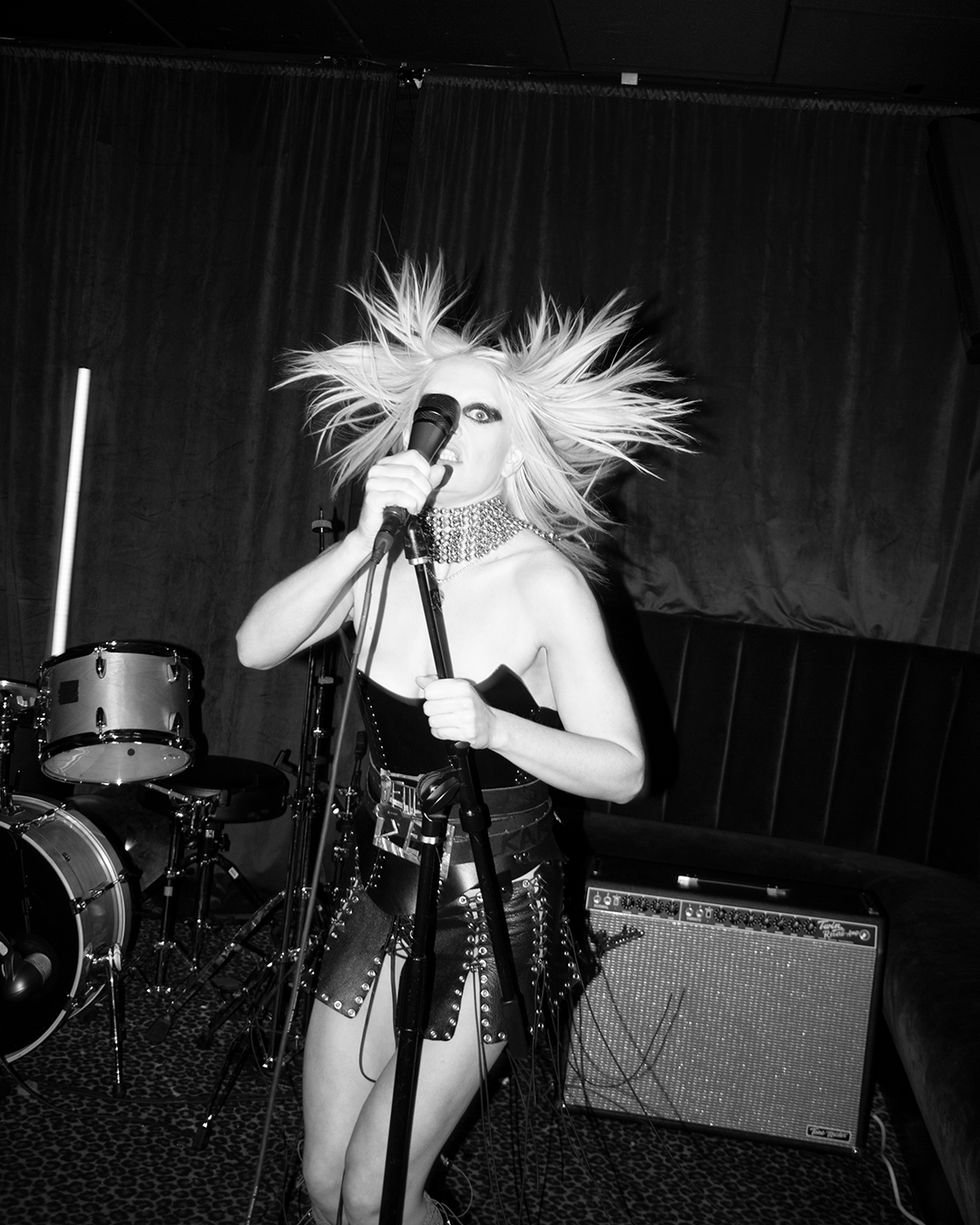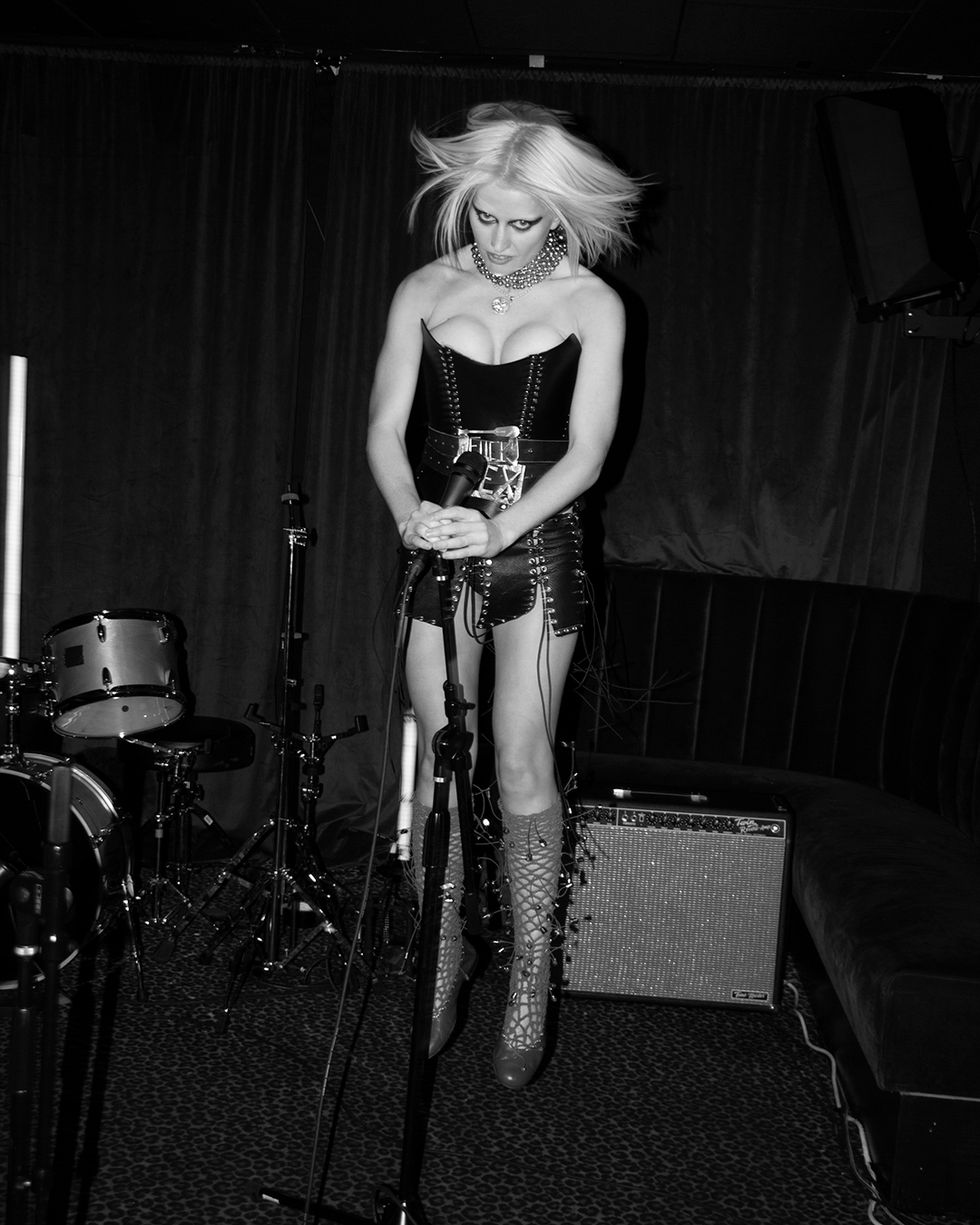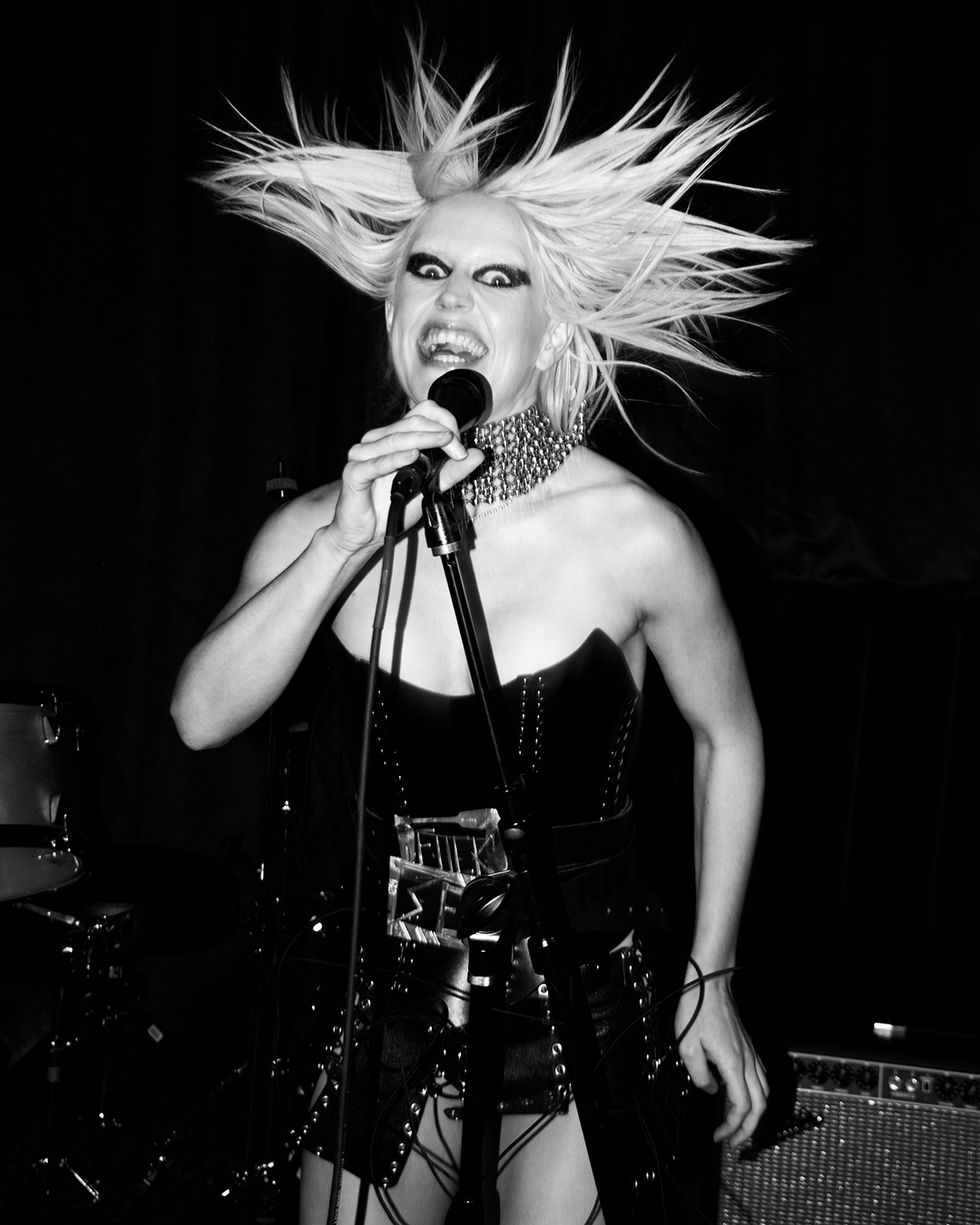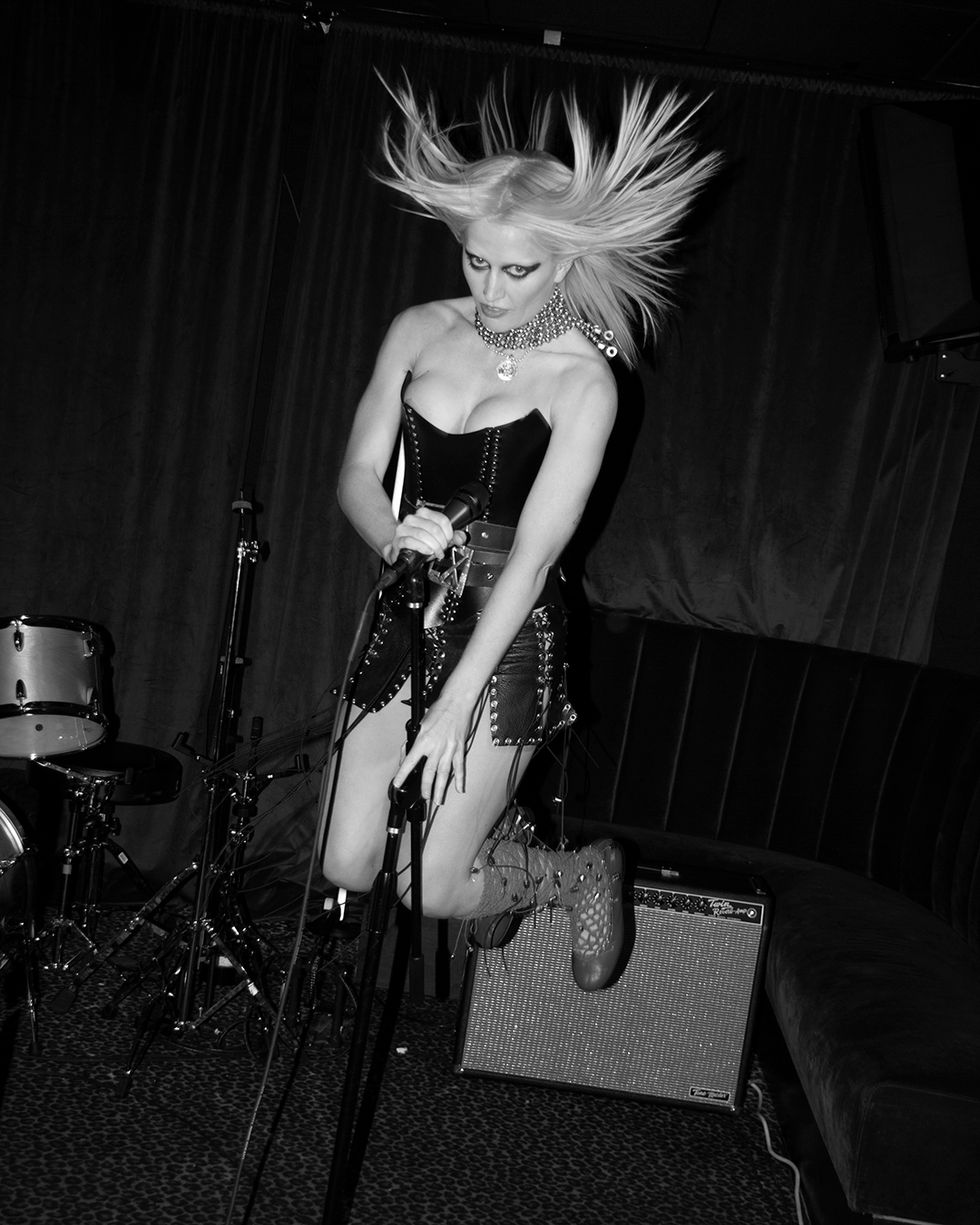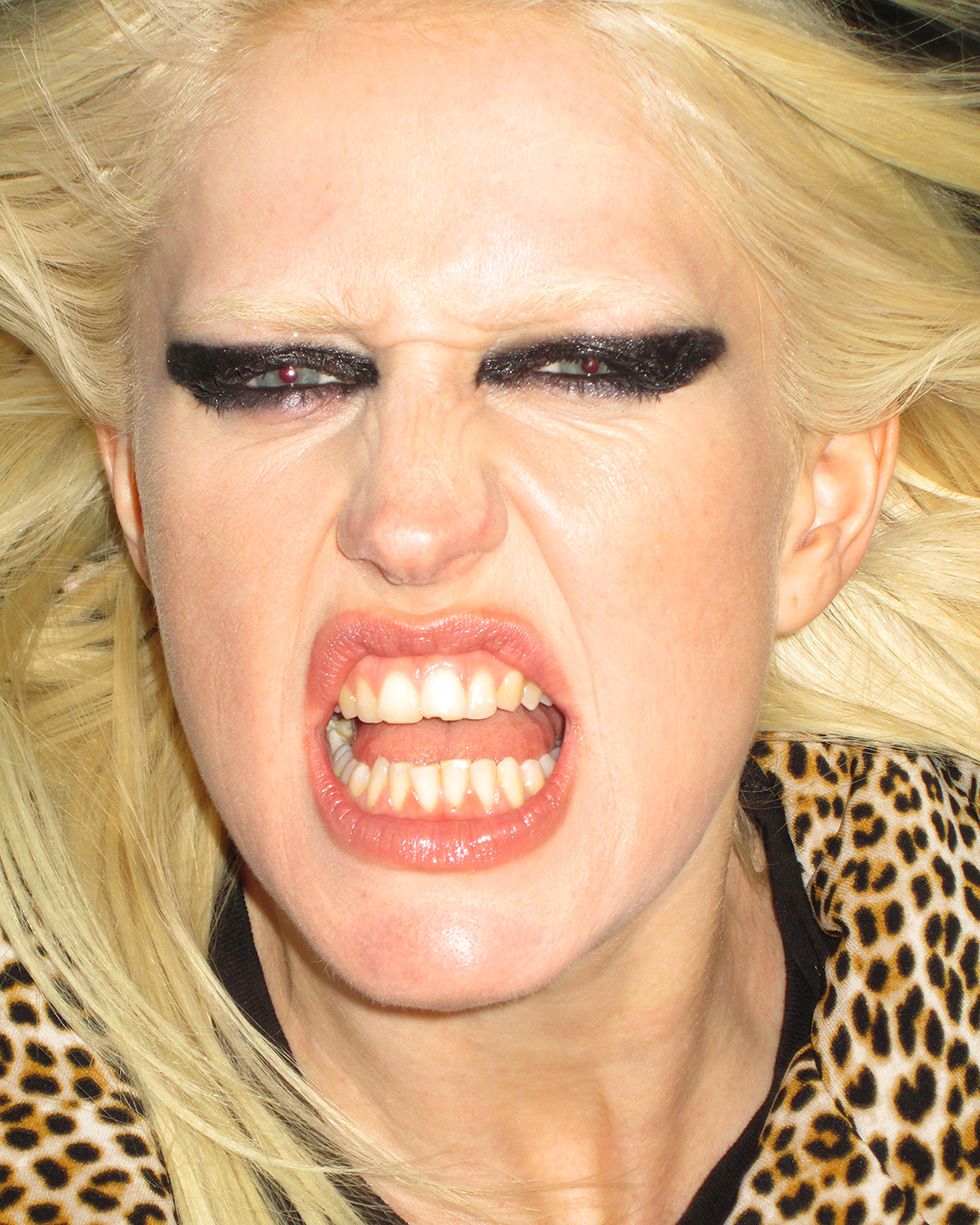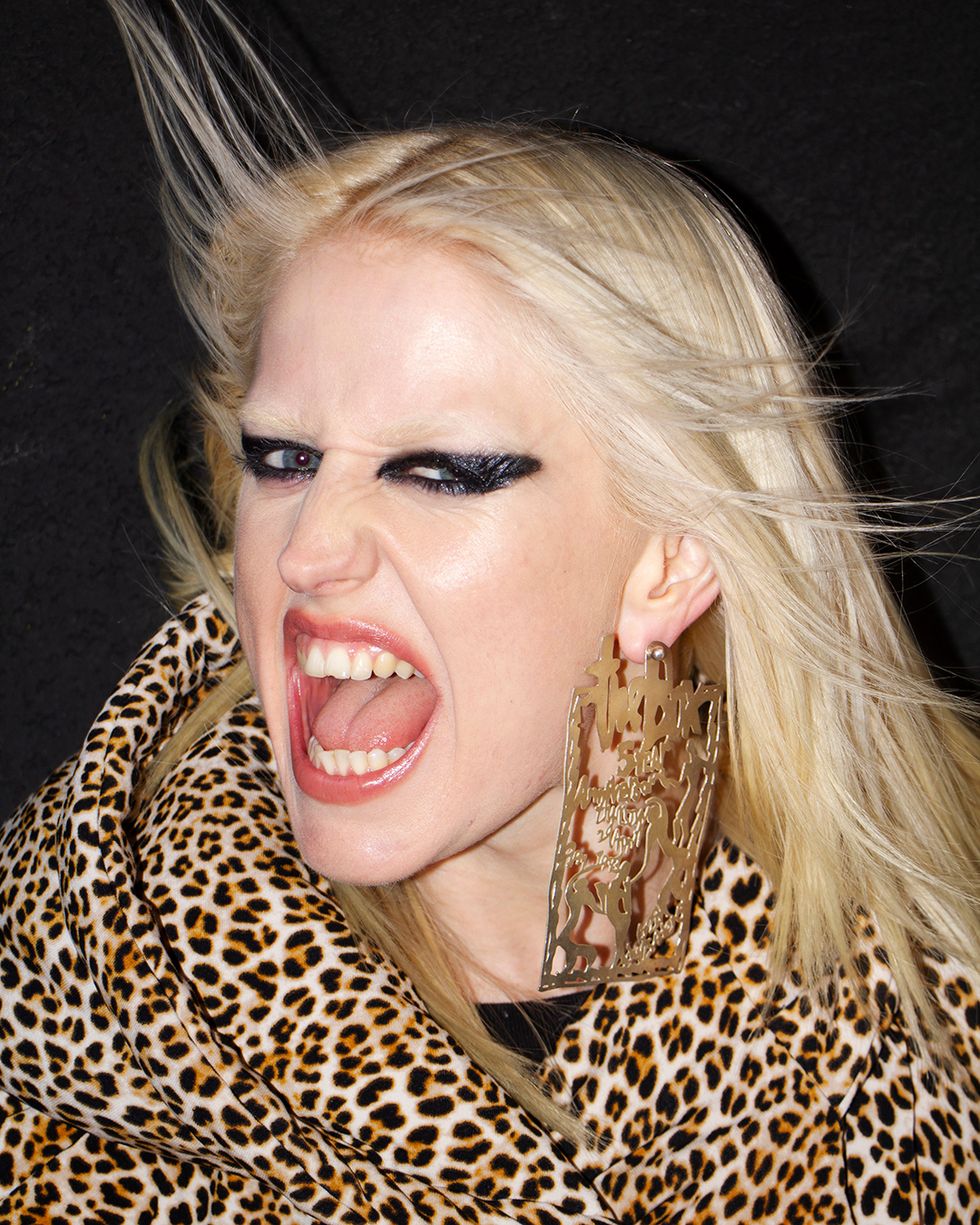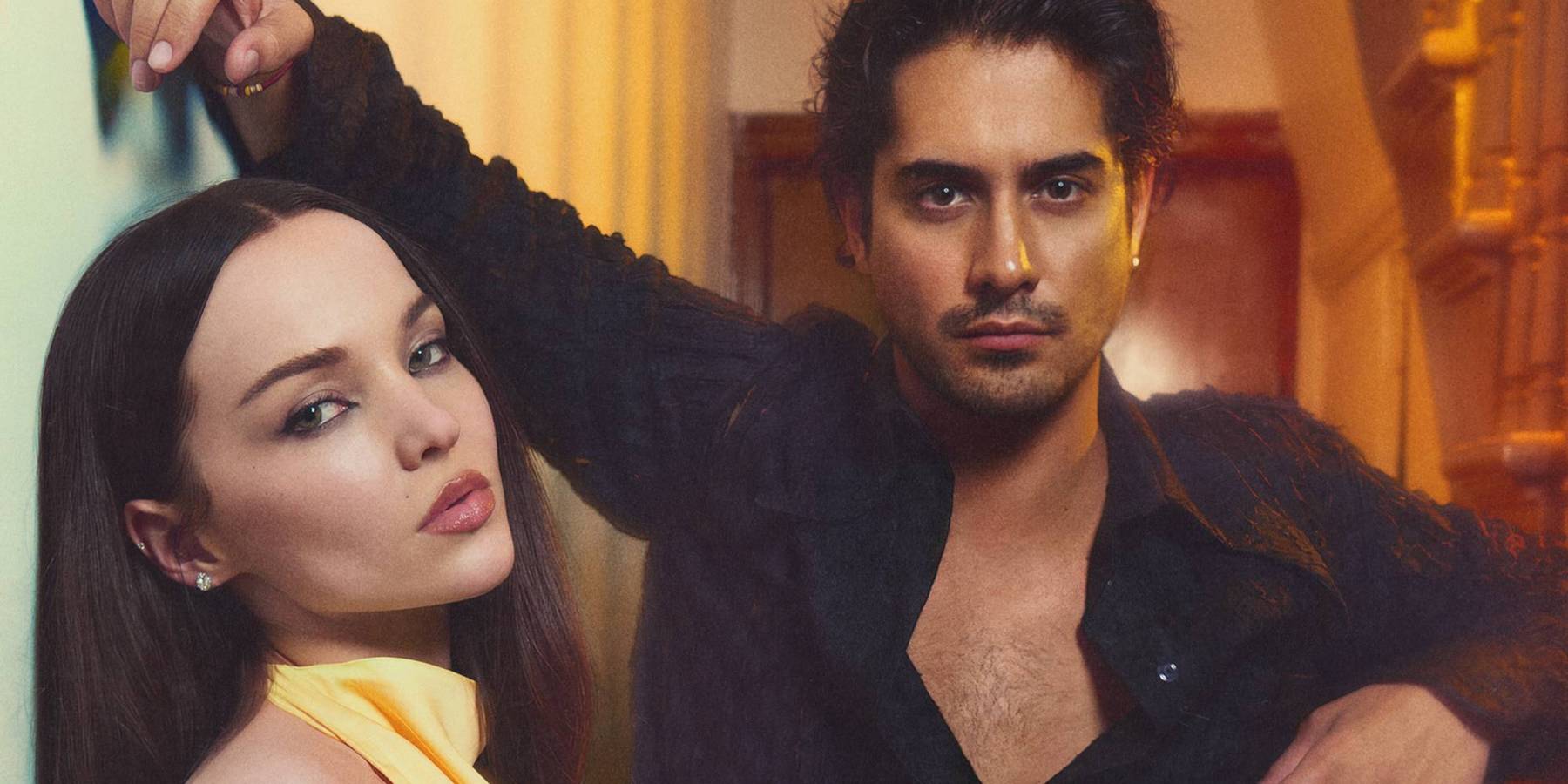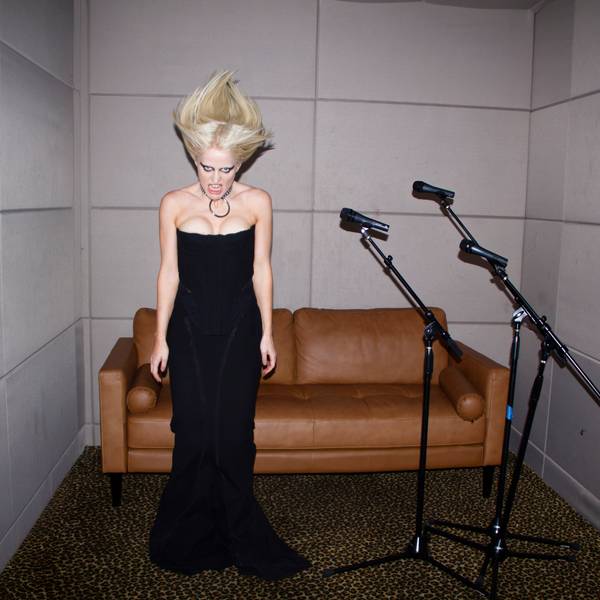
Amyl and the Sniffers Want You to Let Go
Story by Erica Campbell / Photography by Joaquin Castillo / Styling by Stella Evans / Hair by Chika Nishimaya / Makeup by Amelia Jackie
Nov 18, 2024
Amyl and the Sniffers launch their third album, Cartoon Darkness, with the blistering opener, “Jerkin’.” On it, frontwoman Amy Taylor spits, “You’re a dumb cunt, you’re an asshole/ Every time you talk, you mumble, grumble/ Need to wipe your mouth after you speak, ‘cause it’s an asshole.” As the track rams in, walls of spiraling distortion and clashing percussion punctuate her Australian accent: “You are ugly all day, I am hot always,” Taylor defiantly shouts. The accompanying music video embodies the song's middle-fingers-up attitude, with quick flashes of naked, unapologetic bodies. It’s in-your-face, a bit silly and a reminder, much like the rest of their album, to do you and fuck the haters.
Over Zoom, Taylor wears a massive grin and even bigger curlers that pull back the singer's bright blonde hair, setting her strands for a signature ‘70s style that could be lifted from The Runaways' Cherrie Curry. She’s prepping for a show that evening at a record store in London. It’ll be the first time Amyl and the Sniffers play Cartoon Darkness in full, and fans will get their first listen of the 13 tracks that wade into waters of lyrical absurdity while holding the depth of what it means to dream big.
“It was a conscious thing from a lyrical perspective,” Taylor says. “I definitely wanted [the music] to mean something, but I also wanted something that felt fun and carefree and not too serious. I wanted to make people laugh. I feel like a lot of times, people confuse fun and funny. There were times in the studio where someone would say, ‘That’s a bit too funny.’ But it’s not funny, it’s fun. You just forgot what laughing is. That’s something I wanted to keep. For me, it’s such a survival mechanism, a laugh. You can laugh through things and make it light-hearted. Then it’s not this final beast, it’s comedy.”
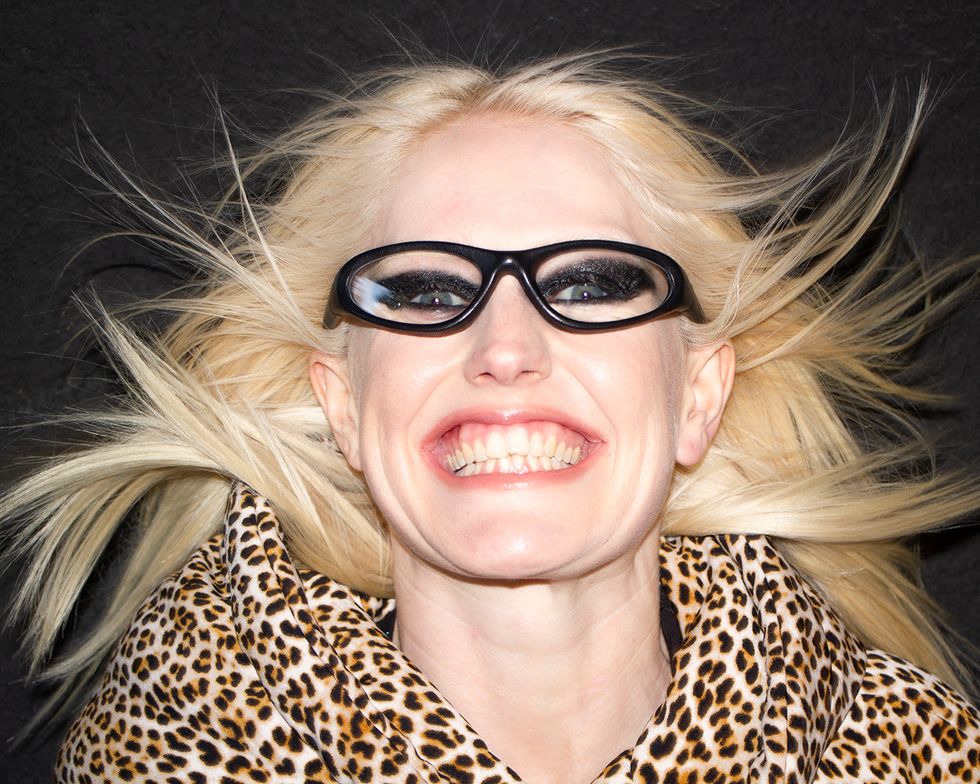
Jacket: Talent's own, Glasses: Gentle Monster
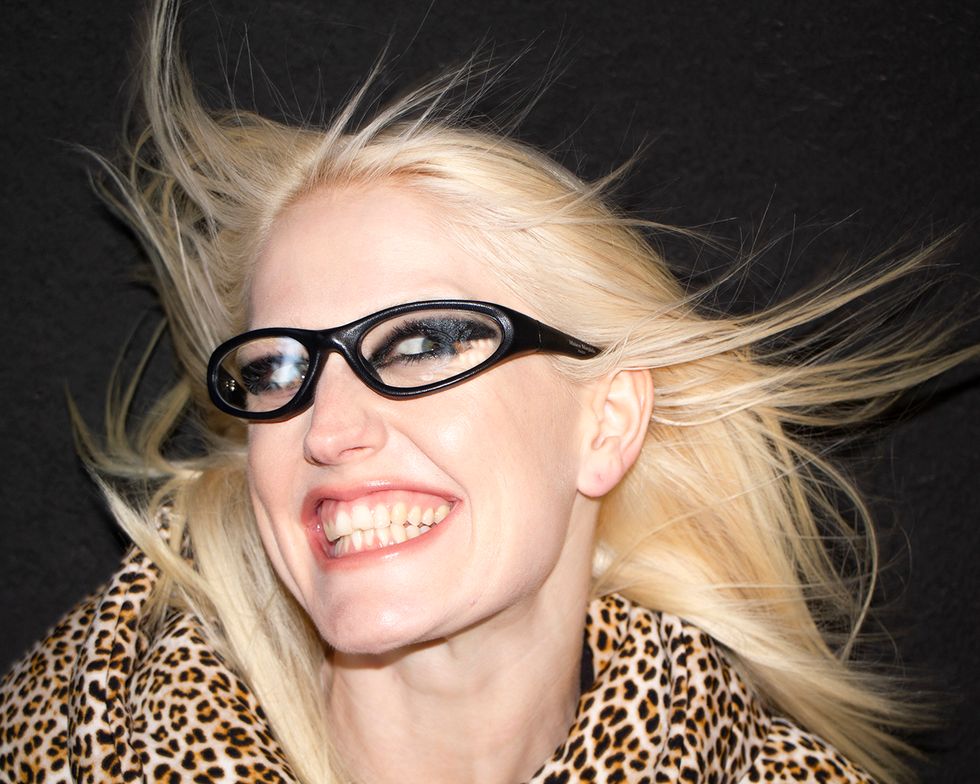
Jacket: Talent's own, Glasses: Gentle Monster
Cartoon Darkness follows 2021’s Comfort to Me and the band’s 2019 self-titled debut, both of which are brash and crashing. You can taste the sweat and feel the heat of small punk shows, where they originated. Previous releases pushed Amyl and the Sniffers onto larger stages with international tours, so when they went into the studio for their third project, Taylor, guitarist Declan Mehrtens, bassist Gus Romer and drummer Bryce Wilson wanted to up the ante and give fans a more evolved version of their sound while staying true to themselves.
On the gritty “Chewing Gum,” they embrace naivety over retro guitar chords, winking at the hedonism and nihilism of young, dumb love. “U Should Not Be Doing That” sees Taylor write about embracing her mannerisms, style and everything about her that has been criticized as too big, too much or too loud. On the stadium-worthy anthem, “Big Dreams,” Amyl and the Sniffers pay homage to where they’ve been and where they’re going, while on “Tiny Bikini,” Taylor celebrates fearless fashion choices. When asked what she hopes people will feel when they hear the album live, Taylor responds succinctly: “Life is meaningless garbage, and that’s a beautiful thing.”
Below, PAPER chats with Amy Taylor of Amyl and the Sniffers about online voyeurism, the surprisingly profound art of wearing a tiny bikini and writing songs that “rub people’s faces in their own piss.”
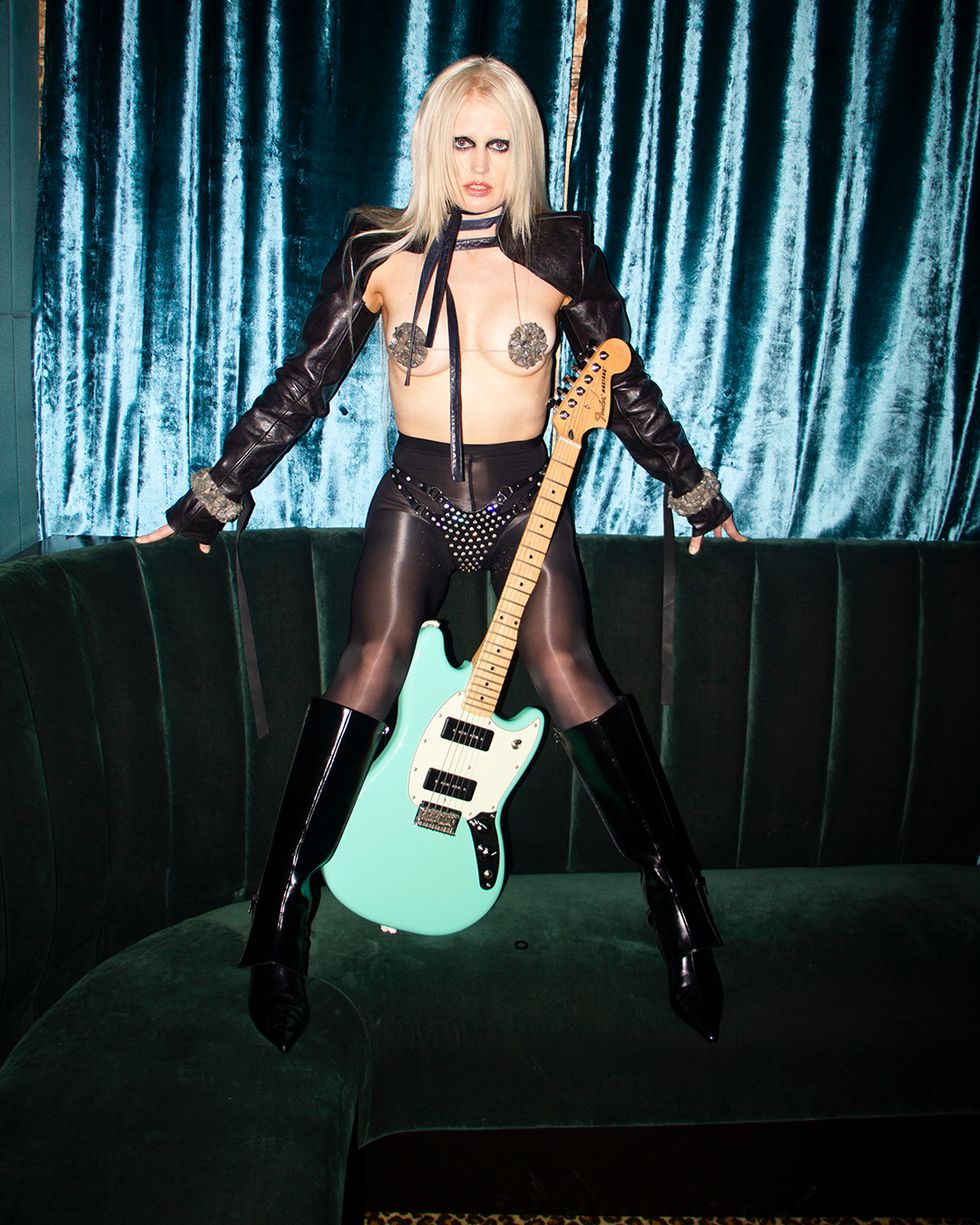
Jacket: Eleen Halvorsen, Bra and bracelets: Mel Diosa, Panties: Zana Bayne, Shoes: Jeffrey Campbell, Tights: Stylist's own
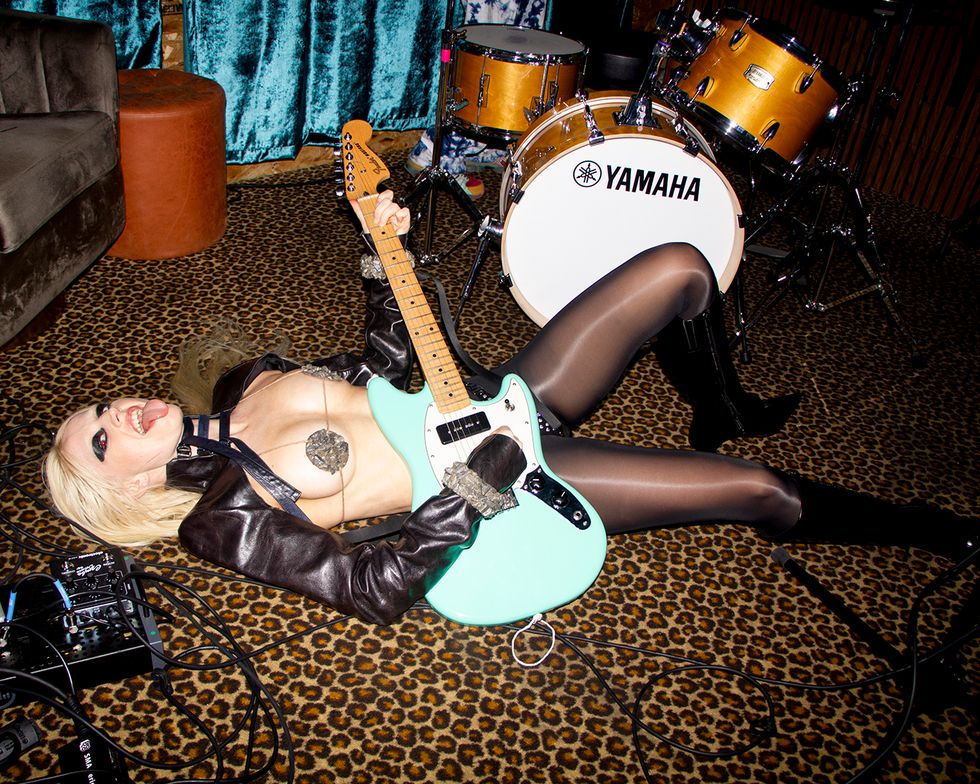
Jacket: Eleen Halvorsen, Bra and bracelets: Mel Diosa, Panties: Zana Bayne, Shoes: Jeffrey Campbell, Tights: Stylist's own
What was the energy getting back into the studio for your third album? What were you and the band hoping to achieve?
After Comfort To Me, we were touring like mad dogs. We were on the road constantly and in the start of 2023 we really wanted to write, but we had so many tours coming up. So in between the tours we would go into the rehearsal space in Melbourne and be like, “Let’s just write as much as we can.” Honestly, it took a long time to get our juices to start going again, because it was almost three years since we’d wrote last. So we were just like, “Bring everything whatever it is and don’t criticize too much and see whatever the fuck comes out.” We had a lot of chats before and we wanted to make it feel different to what we’ve done and try to push ourselves. We had this crazy opportunity to get better and try different things because we’d been so busy and we’d grown so much. We didn’t want to stay in the same place. We wanted to see what we could shift without getting rid of ourselves too much. That was our headspace.
In the album bio, you have this great quote: “We look like adults, but we’re children forever cocooned in a shell.” It’s such a relatable way of describing what so much of our generation feels like. From your experience and perspective, what makes you feel that way?
There’s this podcast by this Irish guy, called The Blindboy Podcast. In one of the episodes he was talking about this theory, called “Perpetual Kitten Theory.” The theory is that we have pet cats, but they behave like kittens because we treat them like they’re kittens all the time. Only kittens meow for food and only kittens behave the way that full-grown cats do. The theory is that because we’re mothering them and constantly feeding them they have no independence, so they’re kind of like perpetual kittens. He applied that to our generation. I’m born in ‘96, and [the host is] the same generation. We’re full-grown kittens because we’ve been kept in this state of perpetual kittenhood. We’re never really taught how to do our taxes or be adults, the stuff that classifies adults. We’re technically adults in the physical form, but we don’t know how to critically think. We’re just like, “What the fuck is going on?” I love that thought, because I look around and I see a lot of that and I wanted to get that into one of the songs.
You also talk about going headfirst into the unknown and embracing it. What about that excited you, as someone who is creating art, that discomfort of not knowing what’s next?
A lot of it comes from doomerism. A lot of what I’m talking about in this album is generational, like the cross-section of AI and technology and all the fucked up politics and the climate crisis. I do feel a sense of doom for the future and that can make me want to smoke a million cigarettes and give up. But I want to feel hopeful because if I just give up nothing will change. Again, it’s a coping mechanism to go, “The future is just a sketch. It’s not real. It hasn’t happened yet. It definitely looks like it’s going to happen like that and it probably will but it might not — it hasn’t existed yet.” That’s from a zoomed-out perspective. From a personal perspective, it’s like fear in the future, but we’re way more adaptable. I think of myself, I’ve gone through so many bad things already. If more bad things happen I would get through them. The avoidance of unpleasant things, even when I was younger and I would watch TV and I had to watch something crap on TV because I didn’t get to choose and now we have Netflix and I don’t have to watch anything I don’t like. We acknowledge that there’s always going to be discomfort and there’s always going to be stuff that’s really hard, but it’s part of our DNA to adapt to that and get through that. Rather than coddle ourselves out of it like, “It might be bad, it might be hard, I might be criticized, I might die, I might get bashed in the face.” But I’ll get through that. That’s what I want to embody.
That's a great way of looking at life. We’ve been through and survived bad things before, so how bad could it be? You recorded at 606 Studios in Los Angeles, on the same desk that captured Nirvana’s Nevermind and Fleetwood Mac’s Rumours. What was it like to know you’re part of that story now?
It’s pretty special. At the time I was like, “If we make a bad album, it’s definitely our fault.” We were in LA, we had the studio, I was like, “This is it, it’s on us if it’s crap.” It felt really special. It’s something that I probably won’t be able to acknowledge until the future when I’m looking back, that we were part of it.
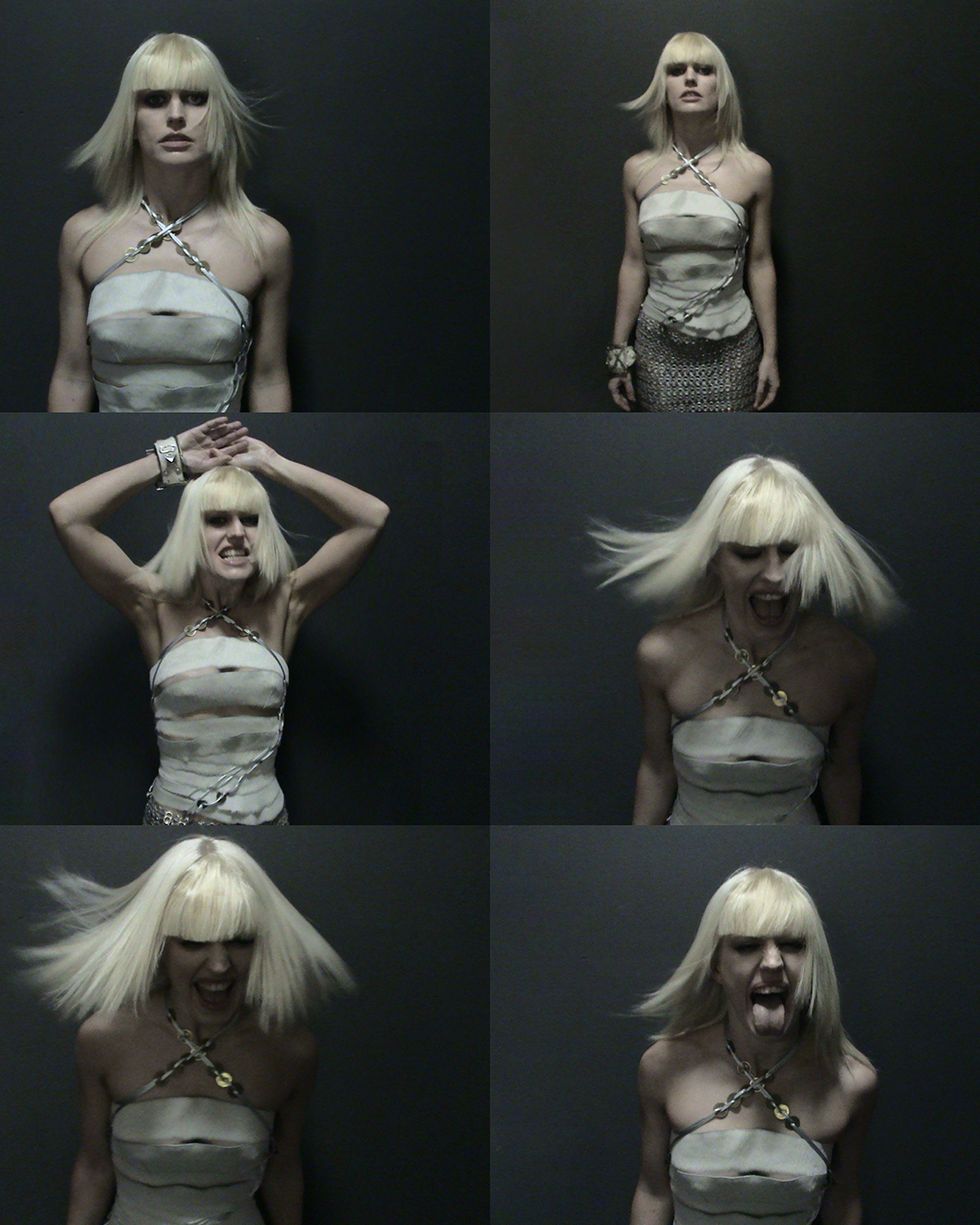
Top: ORIENS, Bottom: Shame, Bracelets: KARTHUR and CHRISHABANA
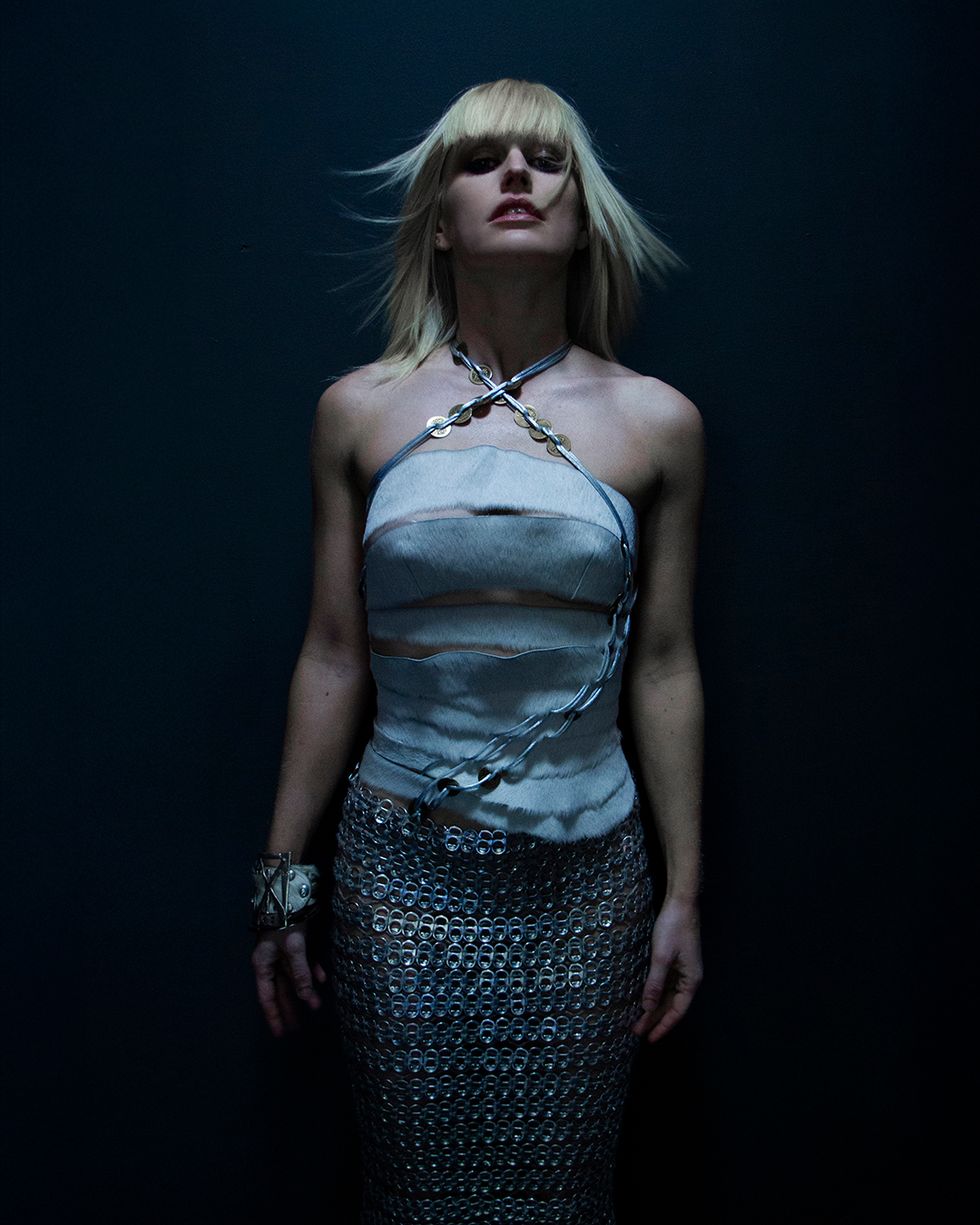
Top: ORIENS, Bottom: Shame, Bracelets: KARTHUR and CHRISHABANA
You mentioned how you went into recording without critiquing anything and just putting it all out there. What were some of the highlights in the studio that came from that? When could you see Cartoon Darkness start to take shape?
For me, it would’ve been when I first heard “Chewing Gum” recorded. In the writing process we wrote a lot of songs, we scratched so many, then we came to LA and did more demoing. And I was like, “I don’t know what this is yet, I don’t know what it means to me.” Then I heard “Chewing Gum,” actually recorded, and I was like “Fuck yeah!” The guitar solo, everyone sounded so good. It felt special, it was all making sense. It was like cooking and you’re like, “What is all this random shit?” Then in the end you’re like, “Okay yeah, this is gonna taste good!”
“Chewing Gum” is such a fun song since it hits on that energy we’ve been talking about and this idea of being young, dumb and in love, and not taking things too seriously. What were you hoping to convey with this track?
When I was writing that song, it was this feeling of suffocation and restraint. I felt really boxed-in and really withheld. All the verses are talking about this constant wanting of something. You know, that thing with the donkey having the carrot in front of its head. Life feels like that as I get older, like there’s always something just around the corner. Even as a band, it’s like, “We’re getting bigger, but the expenses are going up.” When’s the moment when you can just celebrate, be stupid, be young, let go? Do something that’s not for anything and is just for me? That was the feeling. And I still feel like that in a lot of ways and I look and it’s the same with a lot of people in my life. They work so hard, we’re all working so hard. And it’s like, "Damn, when are we going to be able to live?"
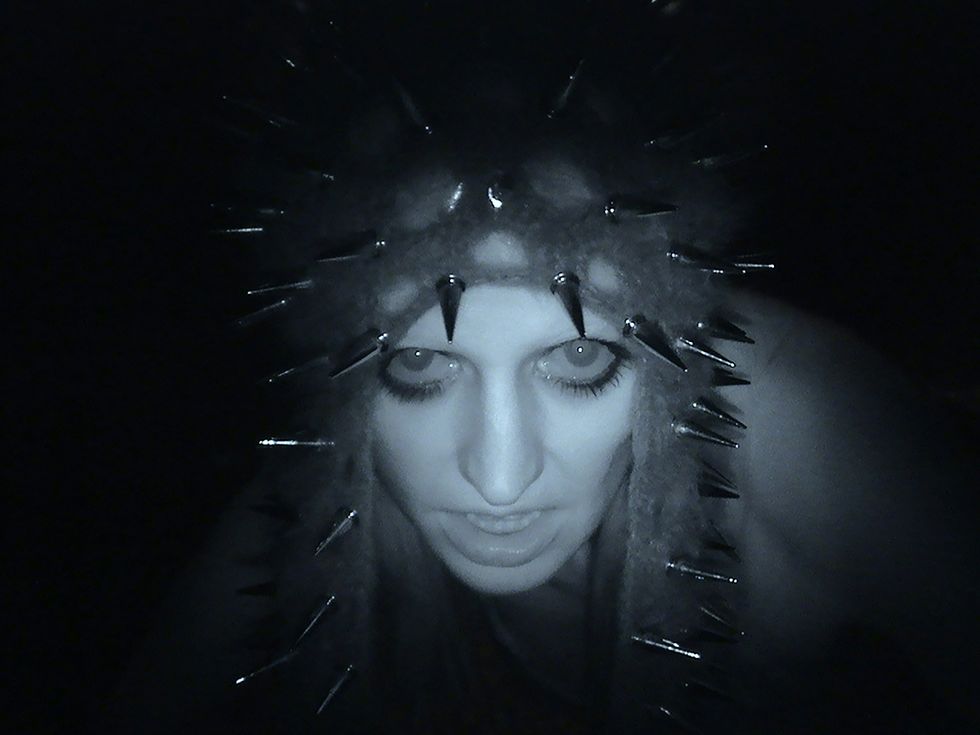
Hat: Gui Rosa
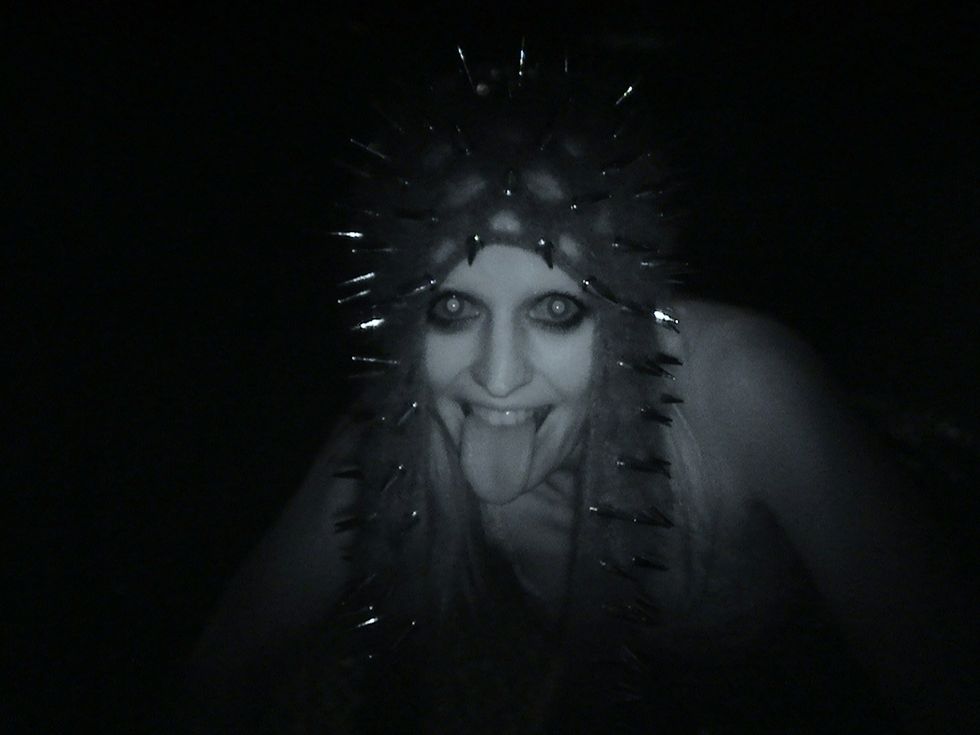
Hat: Gui Rosa
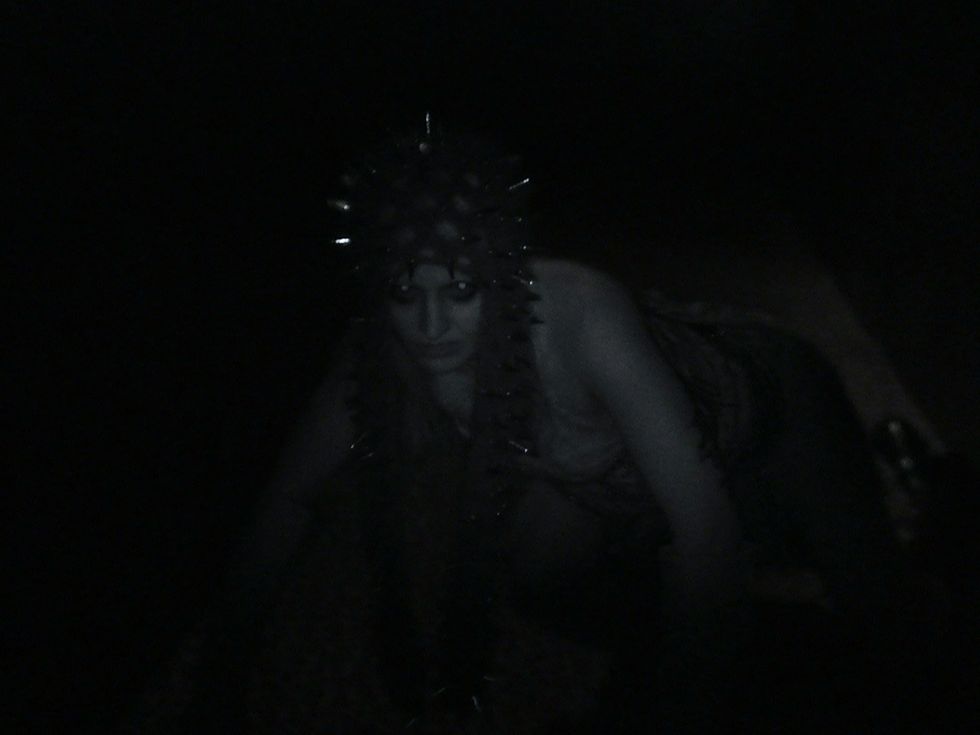
Hat: Gui Rosa
Let's talk about “Tiny Bikini” and your thoughts on fashion in general. What did you want to convey through this track?
That was the first song we recorded. I always try to make a space where there are as many women around as possible, but in rock and roll honestly, it can be kind of tricky. We’re in a studio and everyone is awesome, but it’s just me and a bunch of dudes. Sure, this is technically my space, you know, female-led punk band, sure, sure, whatever. But, at the end of the day I’m the only one snazzing up. I’ve got my blue eyeshadow on. My small victory is how I dress and what I wear. It’s my way of carving out my feminine space. I’m gonna wear these micro-shorts and this tiny bikini and make my hair all big. That’s a small victory, I get to express my femininity. Femininity is a strength and not a weakness. Sometimes people criticize female musicians like, “Why do they have to wear tiny bathing suits on stage and men have to wear normal clothes?” I see it as, “Why do men have to wear normal clothes and girls get to wear fun clothes? Like, that sucks for you guys!” Don’t get me wrong, I’ll wear track pants and I don’t give a shit as well. But the fact that I allow myself to do that is so important to my expression. The world kind of hates women. I’ll go to the shop and do something super normal in jeans and a shirt, and I still get harassed. I get harassed no matter what I wear. So for me it’s going, “I’m gonna be loud and rub this in your face.” It makes life more exciting. One of the lines is, “If I didn't show up in something spicy/ The cold world would feel even more icy.” The world is a horrible place sometimes, but there’s so much beauty in it and some of that beauty is in how we wear stuff. Even if it’s just choosing a really ugly outfit, just shake some shit up.
The “Jerkin’” song and the video are so good. There’s a message there that’s fun and cheeky, but it’s also really positive. How did this song come to you in the studio?
I don’t think I’d written too many lyrics for it. It was the end of a long day. I’d just been sitting around and I was like, "I’ve got to knock over some lyrics," so I smashed a couple of White Claws and basically freestyled it. It came really naturally. I wanted a song big upping myself like, “I’m awesome and you’re shit!” I listen to a lot of hip-hop music and I love the way they’re sometimes like, “You’re a loser and I’m not.” It’s so simple but really empowering. There is so much criticism and hatred and negativity and bringing other people down. I was on TikTok and there was an old man making a milkshake and he had a big following. The first comment was, “I’m so fucking sick of this guy.” I’m like, "Dude, shut the fuck up. He’s like 85 making a chocolate milkshake." The second comment was like, “This guy’s a massive loser!” It just reminded me that people love to hate. And it’s like, if you love to hate, I’m gonna hate you back.
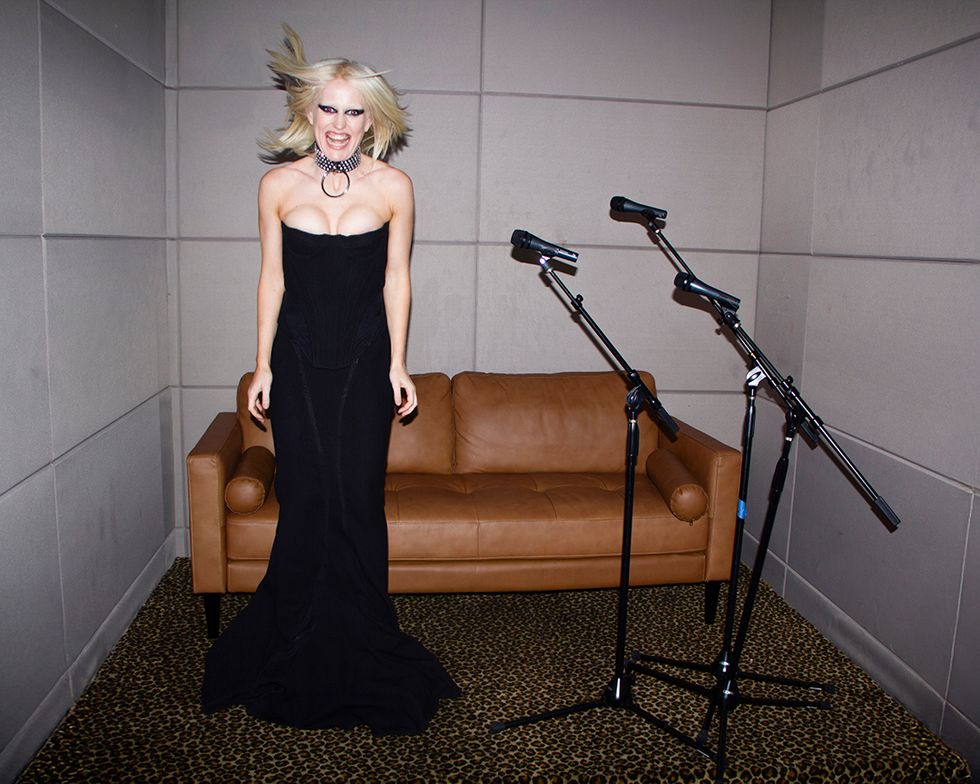
Clothing: ORIENS, Choker: Zana Bayne
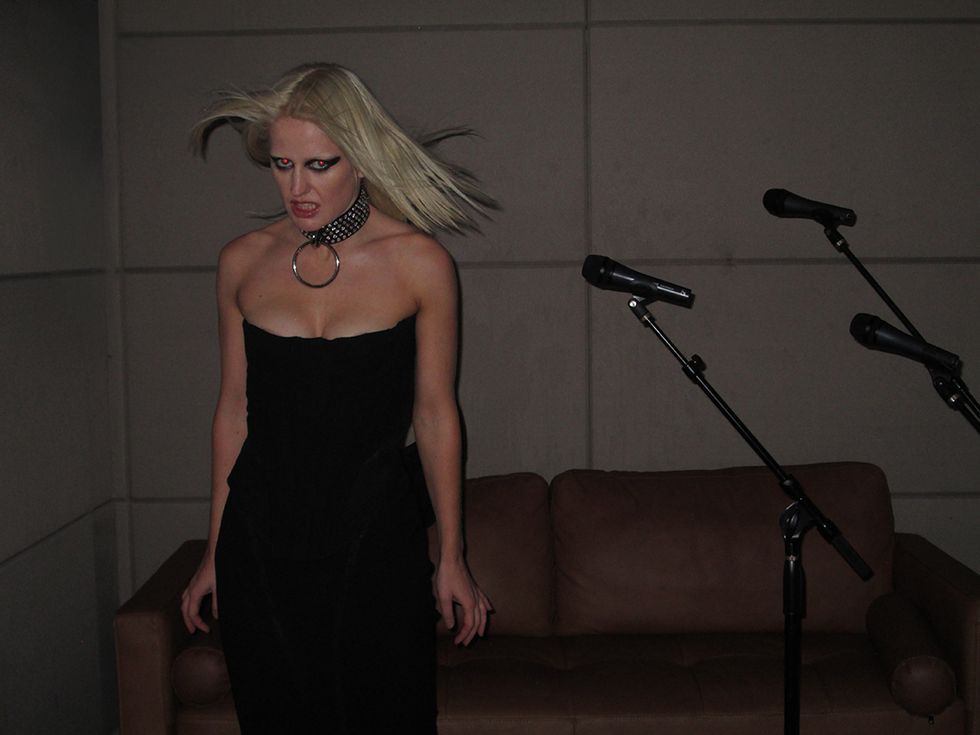
Clothing: ORIENS, Choker: Zana Bayne
The internet has this weird voyeuristic side where you’re given feedback that may not make sense but constantly seeps into your head. What’s your relationship to the internet, this thing that we all have to navigate to make anything?
With the album cover, we’re trying to tap into that a little bit. We’re trying to mimic the idea of the Google [Maps] car going past and capturing you in the moment and your response is to be like, “I’m gonna put myself out there, I’m gonna flash my tits!” But at the same time you’re kind of aggressive like, “Fuck off,” but also, “I’m exposing myself to you.” That really relates to what you just said. I have a super fucking weird relationship to it. It’s weird and everyone agrees, it should be useful and helpful but it’s rotting our brains and making us feel weird. But we’re like, “Let’s go online more!” It’s like the replacement of lead in paint.
The track “U Should Not Be Doing That” digs into the idea of what you’ve mentioned before, wanting to be the biggest version of yourself but people trying to tone you down and put you in a box. What was going on mentally and emotionally that you wanted to get on paper?
Again, just rubbing people’s faces in their own piss like, “That’s embarrassing for you!” I’m not stopping what I’m doing, I’m also not hurting anybody. So yeah, you might be in Melbourne at 3 AM doing coke with a bunch of other losers talking about us and saying, “I can’t believe they’re doing this,” or, “I can’t believe they’re doing that,” but at the end of the day I’m still doing it because that’s the choice I did make, could make and am so lucky to have. I hope you have the best and hope you make the decisions you can. I’m making decisions for me and sorry that you don’t like that but it’s not stopping me. You might be over there hating, but I’m over here doing this. [Laughs] Fuck you guys!
What’s the Melbourne music scene like?
It’s a really amazing scene. There’s so much good music. It’s super supportive and all of Australia has a thriving music scene. Super supportive, lots of great local bands. But Australia in general in and out of music has this thing, called “Tall Poppy Syndrome.” So when a poppy, the flower grows, the others try to chop it down because it will steal the sunlight. It’s a zero-sum theory, where it’s like, “If you say she’s hot, then I’m ugly, so fuck her!” It’s that sort of thought process. Australian culture is like that and I don’t subscribe to that. If I see someone who is doing well, I’m really proud of them. They’re representing me too, lifting each other up. I’m fans of almost everyone. So that’s what I guess is the problem, though. Also, it’s thriving because they’re so anti-big stuff. That’s how a small community thrives. At the same time, I didn’t come from that community, so to be outcast by a small number of people? I’m just like, “No, fuck that!”
That's like the crab mentality: when one crab tries to get out, the rest of them drag you down.
That’s exactly what it’s like. It’s so parallel to an abusive friendship or relationship. If I had a partner that was like, “Don’t go to that awards night," or, “Don’t hang out with those people." So you’re in control? You’re trying to hold me down because you’re not happy for me. I’m like, "No, fuck that."
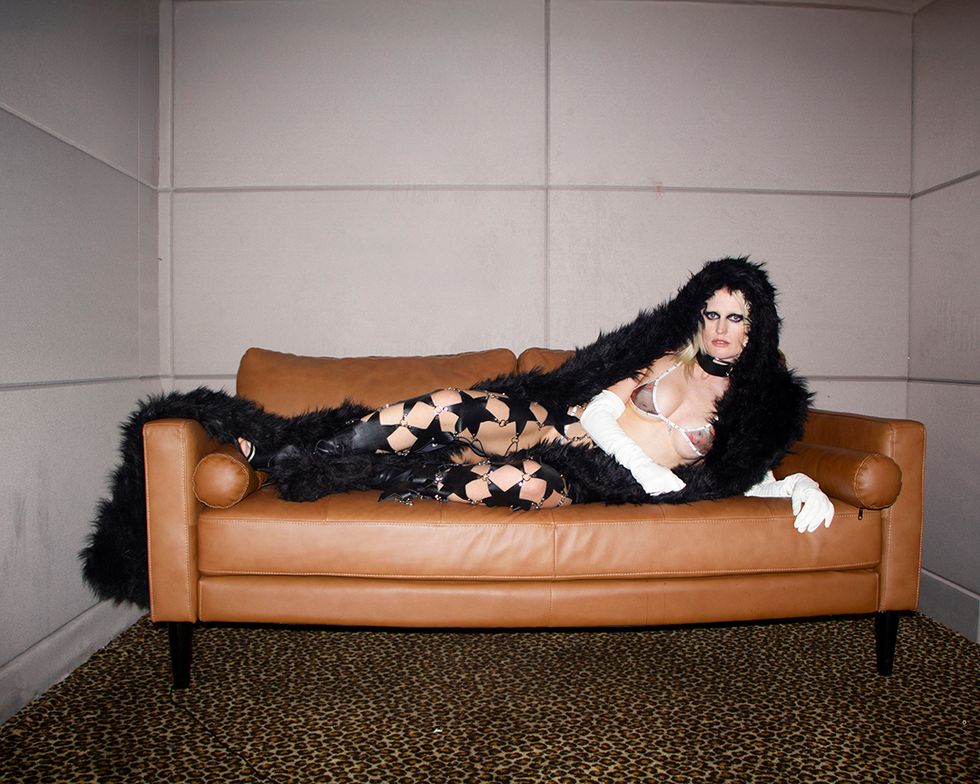
Bra and panties: Haphazard, Bottom and choker: Zana Bayne, Scarf: Rex Yeewang, Gloves: Carolina Amato, Shoes: Jeffrey Campbell
In the “Big Dreams” video, you’re on a motorbike in the desert. Where was that filmed?
That was filmed in Joshua Tree in California.
It’s so beautiful and such an anthemic song. It feels really spacious. What did you want to give people with that song?
The overall theme of this album, it’s such a dreamer’s album. Wanting more from something. When I was writing that I was in Melbourne. Melbourne had the longest lockdown in the world and I think as a city it suffered from that. There are a lot of people working super hard that have these big dreams. We’re so lucky as a band that we’ve had these different versions of success. But I look around and I see these people that are musicians, creatives or even studying to be nurses or whatever, and they’re so good at what they do and they’re so passionate but this commercial idea of success is so pointless when I see what they’re doing and they’re so good at it. I can go to their show and think, “That’s amazing,” and I’m so blown away and it doesn’t matter if they have commercial success, and I’d love for them to get money, but it doesn’t matter because their passion is so pure and they’re so good and they’re so talented. That song is about that feeling of suffocation and being stuck in your apartment and trying to juggle your work life and your creative life and work is taking up all the time, and you’re like, “How do I get better in my craft when I’m exhausted from just trying to survive?” Most people are in that situation. I’m an anomaly, but that’s not most people’s experience, and I don’t want that to be forgotten.
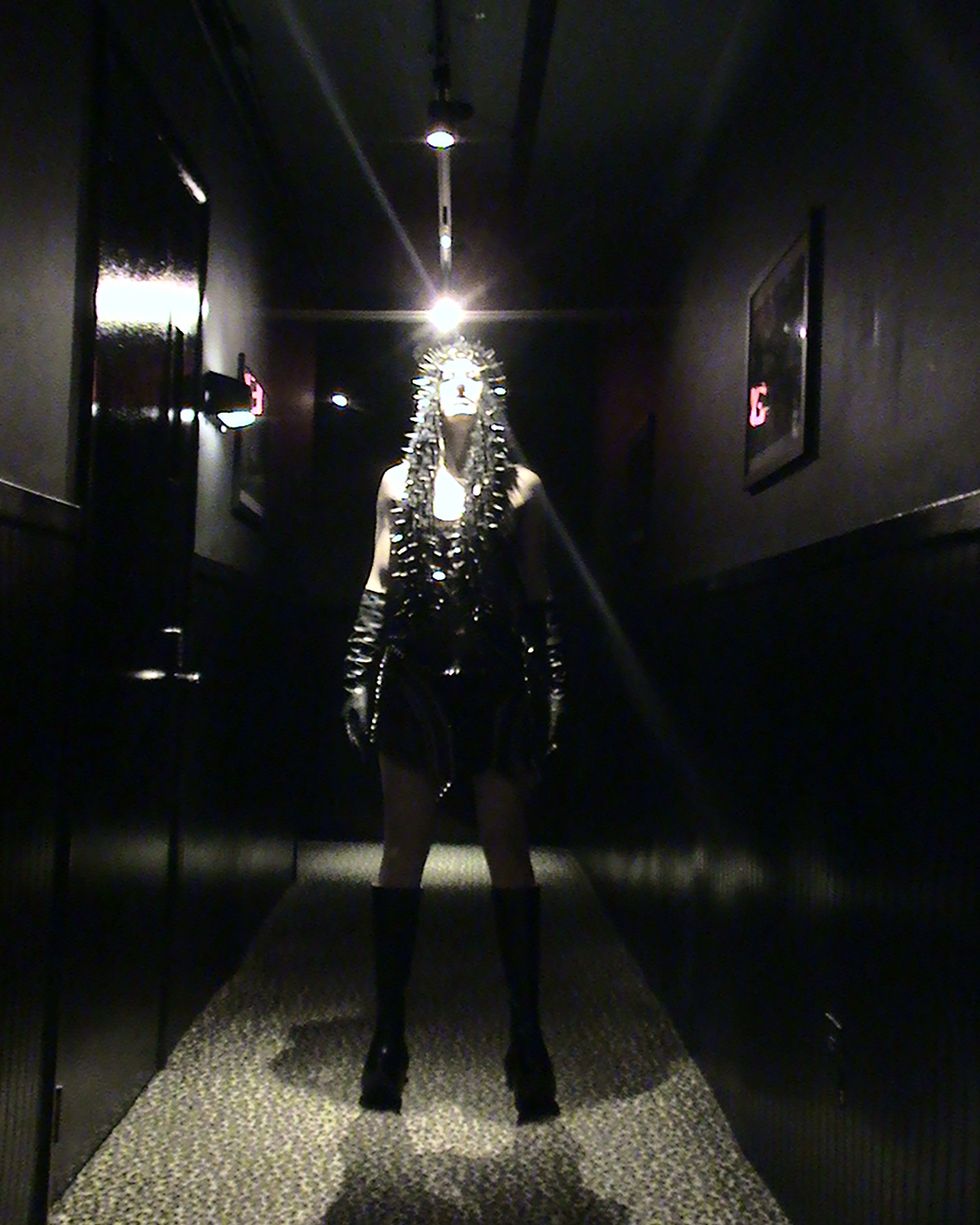
Clothing and hat: Gui Rosa, Gloves: Carolina Amato, Shoes: Fluevog
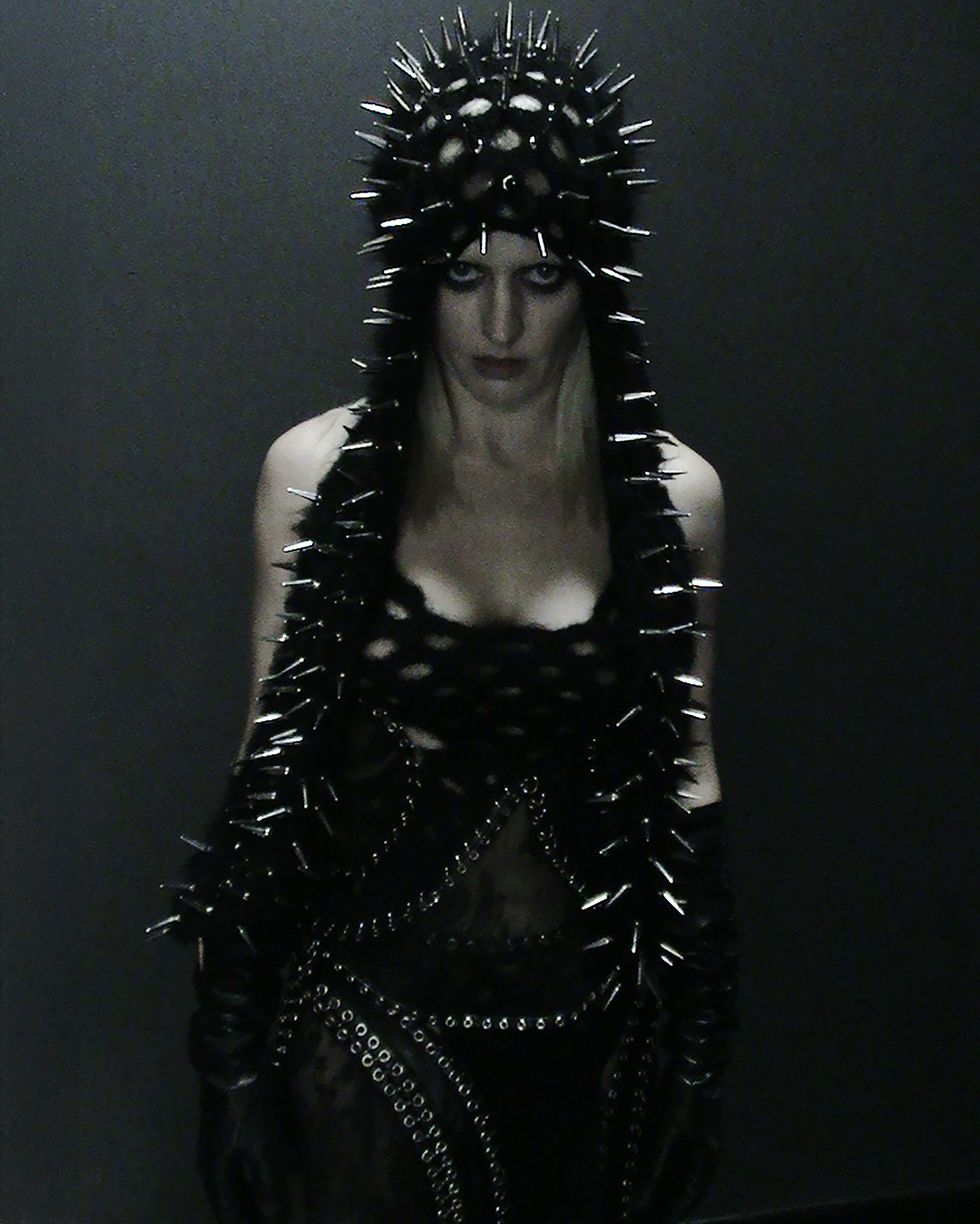
Clothing and hat: Gui Rosa, Gloves: Carolina Amato, Shoes: Fluevog
Photography: Joaquin Castillo
Styling: Stella Evans
Hair: Chika Nishiyama
Makeup: Amelia Jackie
Styling assistant: Isma Andrade
Editor-in-chief: Justin Moran
Managing editor: Matt Wille
Editorial producer: Angelina Cantú
Music editor: Erica Campbell
Location: Gonzo's
Related Articles Around the Web
MORE ON PAPER
Entertainment
Dove Cameron and Avan Jogia Broke Their Molds
Photography by Gustavo Chams / Story by Joan Summers
Photography by Gustavo Chams / Story by Joan Summers
18 February
ATF Story
Madison Beer, Her Way
Photography by Davis Bates / Story by Alaska Riley
Photography by Davis Bates / Story by Alaska Riley
16 January
Entertainment
Cynthia Erivo in Full Bloom
Photography by David LaChapelle / Story by Joan Summers / Styling by Jason Bolden / Makeup by Joanna Simkim / Nails by Shea Osei
Photography by David LaChapelle / Story by Joan Summers / Styling by Jason Bolden / Makeup by Joanna Simkim / Nails by Shea Osei
01 December
Entertainment
Rami Malek Is Certifiably Unserious
Story by Joan Summers / Photography by Adam Powell
Story by Joan Summers / Photography by Adam Powell
14 November
Music
Janelle Monáe, HalloQueen
Story by Ivan Guzman / Photography by Pol Kurucz/ Styling by Alexandra Mandelkorn/ Hair by Nikki Nelms/ Makeup by Sasha Glasser/ Nails by Juan Alvear/ Set design by Krystall Schott
Story by Ivan Guzman / Photography by Pol Kurucz/ Styling by Alexandra Mandelkorn/ Hair by Nikki Nelms/ Makeup by Sasha Glasser/ Nails by Juan Alvear/ Set design by Krystall Schott
27 October
